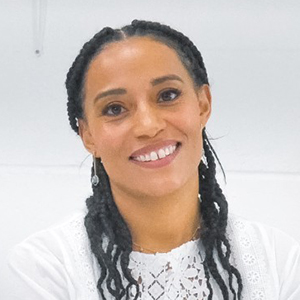
24 October 2023
In her final post of a three-part series exploring the role of institutional whiteness in executive coaching, Bernice Hewson, a coach, racial equity scholar and anti-racism educator, concludes the findings from her master’s dissertation, exploring how coaching can uphold and reproduce racial inequalities, while simultaneously seeking to challenge them. See the first and second blog posts.
In my previous two posts, I explored the problematic nature of the diversity and inclusion (D&I) discourse, the danger of relying on common-sense thinking, and the combined role of dissonance and innocence in maintaining racial inequity. This post concludes the series and examines how whiteness is implicit in our coaching curriculum and ways of knowing as coaches. It invites a much wider discourse, going beyond self-transformation, to question the current boundaries of coaching.
Locating whiteness in the coaching curriculum
Student-led protests at universities in recent years have demanded decolonisation of the curriculum and of knowledge production. ‘Rhodes Must Fall’, ‘I, Too, Am Harvard’, ‘Why Isn’t My Professor Black?’ and ‘Why Is My Curriculum White?”[1] all seek access to an education that doesn’t exclude the historical legacies of empire and the racial hierarchies that are among its hangovers.
A feature of Roche & Passmore’s (2021) antiracism manifesto was to decolonise the coaching curriculum and address the training gaps in relation to racial justice, power and social inequality. My research echoes their findings, exposing coach training curriculums and competency frameworks as insufficient in supporting coaches to understand and navigate systems of power and oppression.
Decolonising the coaching curriculum may seem like an obvious starting point, but this calls on us to first recognise it as colonised. Examining this through the lens of critical whiteness invites us to name how racial inequity is not merely an absence, but a material feature of the coaching curriculum. It is institutional whiteness that causes us to value certain forms of knowledge over others and prioritise funding and research that centres the needs of the dominant majority, in turn informing the skills and competencies of certifying coaches and supervisors.
The American Psychological Association (APA) issued an apology in 2021, acknowledging the role of psychology in ‘promoting, perpetuating and failing to challenge racism, racial discrimination, and human hierarchy in the U.S’. The apology cited ‘white epistemologies’[2] (knowledge centred around whiteness) as general sources of racism in psychology. While not necessarily confined to ‘white’ people or inherently a problem, it can become problematic if it benefits and centres one group’s needs to the detriment of another. This acknowledgement from the APA points to the systematic nature of racism and whiteness emerging independently of any one individual’s good intentions or racial consciousness.
With much of psychological science informing coaching practices, the admission supports the call to decolonise the coaching curriculum. A failure to value other forms of knowing and understanding can lead to epistemic oppression,[3] defined by Dotson (2014) as the ‘systematic exclusion that hinders contribution to knowledge production and advancement’. As a result, we see the reproduction of whiteness through the preservation of a system that both upholds and perpetuates racial inequity.
The need for self-transformation
As coaches, how can we be sure that our practice draws on a depth and breadth of knowledge that has been sufficiently scrutinised to position us in the role of coach. ‘Epistemic responsibility’,[4] a concept rooted in the field of philosophy, refers to our obligation to ‘know well’. Which voices are we listening to, and which voices are we failing to hear? What knowledge do we privilege, and what are we failing to understand? It does not call on us to delete existing knowledge or history, but rather embrace broader knowledge systems which have previously been ignored.
Quick reflective exercise
Your personal inventory – as you reflect on the concept of epistemic responsibility, this is an invitation to consider which voices influence your ways of knowing and being as a coach:
• In your practice, which coaching models originate outside of an ethnocentric culture and knowledge system?
• Is your bookshelf populated with books predominantly written by western scholars?
To know well requires us to be critically conscious as coaches. To develop the skills, knowledge and awareness that enables us to engage with the world through a lens that considers the historical, socio-political, and economic forces shaping our lives. Cushion & Partington (2016) question the level of critical consciousness that professional coaches apply to their work, flagging a concern that a failure to apply this level of intellectual rigour and understanding risks coaching provision and coaching/supervision practices becoming embedded with invisible ideologies.
Time for system-wide change
Equity work cannot be the sole responsibility of the new generation of coaches to redress. As seasoned coaches are continuing to learn, we can consider our obligation to ‘know well’. All too often D&I programmes exist as an optional extra, a CPD exercise, another string to our bow. If they continue to feature as stand-alone workstreams, they will never become integral to the profession and the core skills and practices of coaches.
While it is positive that coaching is starting to embrace what could be described as a ‘racial turn’ through the profession’s clearly stated desire to ‘stand against racism’, the work will be counterproductive if we fail to move beyond our current ways of knowing.
This research has offered a window into understanding how whiteness has been operationalised in the antiracism discourse within coaching. Informed by colourblind, neoliberal ideologies, we focus too narrowly on representation and diversity KPIs to address common-sense problems that we have failed to adequately understand. In the absence of the critical thinking necessary to disrupt racial inequities, the profession maintains the status quo under a veil of innocence – or perhaps ignorance?
The power of whiteness lies in its ability to control the boundaries of coaching. Those bodies in positions of power and influence can choose to consciously make space for new forms of knowledge, to bring in critical voices, to direct funding and research that is focused on driving equity, and critique existing approaches to coaching practice and certification. Then we will be able to examine how whiteness may be implicit in all that we do, and together make a ‘stand against racism’. This is, and always will be, a collective responsibility.
An invitation to act
Believe in the power of your voice and in coming together with others.
Consider:
• Hosting a roundtable with peers in the profession
• Scheduling a virtual zoom call with a colleague
• Redirecting a team meeting to focus on reflexive practice
Perhaps consider:
• What impact does the research have on you?
• What questions are you holding?
• What impact can you personally and collectively have in the coaching profession?
• What is your role in this discourse?
• What is the cost of doing nothing?
I would love to hear your thoughts. Connect with me on email – bernice@raisingracialconsciousness.com – or via LinkedIn.
Notes
[1] University campaigns demanding decolonisation of the curriculum include Rhodes Must Fall, I Too Am Harvard, and Why Isn’t My Professor Black?
[2] White epistemology – a white epistemology is the ignorance, failure or unwillingness to account for epistemic complexity when studying race.
[3] Epistemic oppression – the unwarranted exclusion or obstruction of certain epistemic agents from the practices of knowledge‐production (Dotson, 2014).
[4] Epistemic responsibility – refers to the ethics and politics of knowledge production. Termed by philosophers as our obligation to ‘know well’ (Code, 2020).
Blog series
Bernice Hewson is sharing specific results from her research, exploring how the whitening practices present in the coaching industry serve to uphold racial hierarchies, while simultaneously seeking to challenge them, in a series of blog posts entitled: Hidden in plain sight: Institutional whiteness in executive coaching. The three posts in the series explore:
How antiracist discourse in coaching paradoxically upholds whiteness
How common sense, dissonance and innocence can maintaining racial inequity
How whiteness is implicit in our coaching curriculum and ways of knowing as coaches

About Bernice Hewson
Bernice Hewson is a racial equity scholar, anti-racism educator and founder of Raising Racial Consciousness Ltd. She works with coach training providers and leadership teams to influence and drive racial equity throughout their organisation. She is passionate about supporting individuals and teams that have made a conscious commitment to deepen their understanding of racial equity and inclusion, supporting them to learn and unlearn in a non-judgemental space as they learn to find their voice.
Bernice has a master’s degree in culture, diaspora and ethnicity from Birkbeck University and is an accredited EMCC Senior Practitioner.
Suggested books
To understand performativity in anti-racism work: Ahmed, S., 2012. On Being Included: Racism and diversity in institutional life. First edition ed. London: Duke University Press.
To understand whiteness: Garner, S., 2007. Whiteness: An Introduction. First edition ed. London & New York: Routledge.
To understand the important of critical reflection and critical consciousness in coaching: Thompson,N. & Thompson, S. 2018. The Critically Reflective Practitioner. Second Edition. Palgrave.
Bibliography
American Psychological Association [APA]. Role of Psychology and APA in Dismantling Systemic Racism Against People of Color in U.S. Resolution adopted by the APA Council of Representatives on October 29, 2021.
Code, L., 2020. Epistemic Responsibility. State University of New York Press.
Cushion, C. & Partington, M., 2016. A critical analysis of the conceptualisation of ‘coaching philosophy’. Sport, Education and Society, 21(6), pp. 851-867.
Dotson, K., 2014. Conceptualizing Epistemic Oppression. Social Epistemology, 28(2), pp. 115-138.
Passmore, J., 2021. Future Trends in Coaching: Executive Report 2021, Henley-On-Thames: Henley Business School and EMCC International.
Roche, C., 2021. Speak Up. Speak Out. The Ethics Matter Podcast.
Roche, C. & Passmore, J., 2022. Anti-racism in coaching: a global call to action. Coaching: An International Journal of Theory, Research and Practice, pp. 1-18.
Shoukry, H., 2016. Coaching for Emancipation: A framework for coaching in oppressive environments. International Journal of Evidence Based Coaching and Mentoring, 14(2), pp. 15-30.
Shoukry, H., 2017. Coaching for social change. In: T. Bachkirova & G. &. D. D. Spence, eds. The SAGE Handbook of Coaching. s.l.:Sage Publications, Inc, pp. 176-191.
Teo, T., 2022. What is a White Epsitemology in Psychological Science? A Critical Race-Theoretical Analysis. Frontiers in Psychology, Volume 13, pp. 1-10.
Wekker, G., 2016. White Innocence. First edition ed. s.l.:Duke University Press.
Photo by William Fortunato